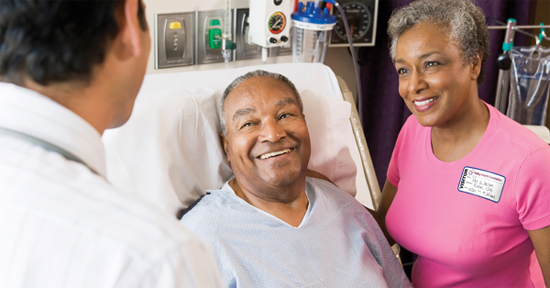Blog
How to visit someone in the hospital - 16 tips from nurses who know
by Paul Kazlauskas

Visiting a patient in a hospital isn’t easy. You are going to see a person who isn’t feeling their best, in a place where no one likes to be. It may be hard to find the right thing to say to make them feel better. Sometimes a hospital visitor can detract from the care of the patient they are there to cheer up. However, you can have a positive influence on a patient’s recovery if you follow some simple visitor guidelines. These 16 ideas are from nurses who have seen it all.
1. Confirm the hospital’s visiting hours. A quick call to the hospital or a few minutes to check its web site will ensure the timing of your visit is good. Reaching out in some way to the hospital also gives them a chance to communicate any special instructions for the visit.
For example, visitors should try to avoid visiting during a change-of-shift report. Most hospitals change shifts between 7:00 and 8:00 in the morning and again in the evening. This is the time when nurses go into the patient’s room and discuss their plan of care with nurses coming on-shift. This should be a private discussion, and there shouldn’t be interruptions in communicating patient information. Overall, the busiest time of day for the staff is 6am-11am as nurses give meds, clean patients, and get labs done in the morning. Because the hospital staff is usually tied up with care, it can be short on updates during this time of day.
2. Confirm the visit with the patient. While the visit may fall during the hospital’s normal visiting hours, perhaps the patient may not be up for a visit. Showing up unannounced could be a waste of time if the patient is sleeping, resting, or is being cared for (not to mention rude, especially if the patient is a very private person).
3. Obey the hospital's visitor management policy. Hospitals have a duty to track the visitors that come to their buildings. Visitor management systems (VMS) allow hospitals to effectively identify who has entered the facility, determine if their visit is authorized, and deny entry to individuals if necessary. When visitors come into the facility, they should be issued a visitor badge to wear while in the building.
4. Visitors should always check in at the front desk before visiting a patient. The reason is to control the number of visitors in a room at a time. Many facilities will limit two to three people at a time. If there are 5-10 people in the room, the staff is inhibited with a lack of space to do their job. More importantly, it can be really overwhelming for a patient.
5. Visitors and family members should designate one spokesperson to ask the staff for updates. Nurses may find themselves filling in a visitor and have to do it all over again when someone else comes in. Visitors should also know that it’s not always possible for medical staff to give complete updates due to HIPAA and privacy issues. If you aren’t the emergency contact or power of attorney, the medical staff may not be legally able to give you a complete, detailed update.
6. If you don’t feel well yourself, don’t visit until you feel better. Practice common sense when there is a possibility of spreading germs. Don’t enter a hospital if you even think you may be contagious. Call the patient on the phone or send a card.
7. Flowers can be a bad “get-well” gift. Flowers are the most popular gift to give when visiting someone in the hospital. However, the patient may be allergic to them. If the patient has a roommate, they may be allergic as well. Plus, depending on the type of care on any given floor, flowers may be against the rules (ex. ICU, CCU). Some alternative gift ideas include a good book, magazines, stationery, or warm socks.
8. Don’t wear perfume or cologne. A strong scent can be stomach-turning and uncomfortable to the patient’s sense of smell. Refrain from using perfume or cologne before your visit and instead apply it after you leave. The same applies to smoking. If you have to smoke, wait till the visit is over before lighting up.
9. Don’t bring food or drink. Patients in hospitals have their food brought to them. Sometimes, they are on a strict diet while staying in the hospital. Outside food and drink will not only undermine their diets, the food may also contain germs that could potentially make the patient more sick.
10. Don’t comment on how bad hospital food is. Your friend or family member is aware of how the food tastes. Like mentioned above, the patient may not have a choice as to what they are eating while in the hospital. Remember, you are there to make them feel better.
11. Leave the diagnosis/care to the hospital staff. Do not ask the patient for a detailed explanation of what they are experiencing and then offer your own opinion on their health or how the doctor is doing their job. Visitors should also step out of the room when patients are getting care. For example, if the patient is being given a bedpan or a medication (like a shot in the stomach), the patient may not want their visitor to be that “up-close and personal”.
12. Don’t bring your “business” into the hospital visit. Make any necessary personal and/or business phone calls before or after the visit. Don’t bring a computer with you to do work. Don’t talk about how stressed you are at work. The focus of the visit should be on the patient.
13. Keep the messages comforting. Don’t come for a visit and begin telling “horror stories” of what happened to other people at other hospitals. Talk about positive things.
14. Don’t overstay your welcome. Many nurses suggest a maximum visit time of 15 to 20 minutes. Be aware of the condition of the patient you are visiting and their ability to enjoy your visit. If the person in the hospital bed keeps falling asleep during your stories, it’s time to let them rest.
15. Never leave your cell phone or other devices turned on in a hospital. Depending on the department, hospitals may post signs stating all visitors must turn off their phones entirely to prevent interference with hospital equipment. Even if you don’t see a sign like that, it couldn’t hurt to wait till the visit is over before using your phone.
16. Unless it’s necessary, avoid bringing children to the hospital. Children are not always on their best behavior. Sometimes they can’t control their impulses. In addition, young children tend to play on the floor and put things in their mouths, which is a very bad idea at hospitals. Unless absolutely necessary, try to leave the kids at home.
eVisitor Software is a stand-along visitor management systems that can affordably increase your facility security and help you always know who is in your building. eVisitor makes it easy for facilities to log, identify, track, and run reports on visitors. Watch this video to learn more, then request a free demo today!
Schedule a demo of eVisitor Software for Visitor Management
Posted on 12/22/2023



 Paul Kazlauskas
Paul Kazlauskas
 Andrew Jones
Andrew Jones